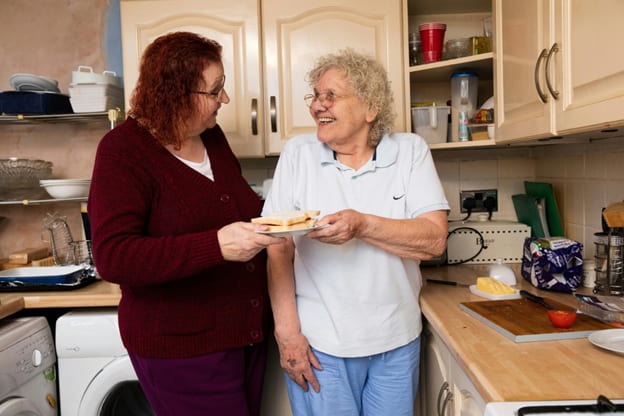Effective communication skills are essential in any caregiving environment, but they become even more critical in senior care. Seniors often face unique challenges, including physical, cognitive, and emotional changes that can impact their ability to communicate.
Enhancing communication skills in senior care not only helps caregivers connect better with seniors, but it also significantly boosts seniors’ well-being. Caregivers can truly impact lives by enhancing daily interactions and understanding individual needs. Read on.
Understanding the Importance of Communication Skills
Communication is much more than just talking. It’s about listening, observing, and responding in a way that makes seniors feel heard and valued. By developing these skills, caregivers can create a more positive and supportive environment.
Building a Strong Connection
Strong connections foster trust and comfort, essential elements in senior care. They cultivate an atmosphere where seniors feel safe to express their feelings and needs. One effective method is to maintain eye contact while speaking and to use a calm, patient tone. This helps in building rapport and makes seniors feel respected.
Active Listening Techniques
Active listening is a cornerstone of effective communication. This technique allows caregivers to truly understand the emotions and thoughts of seniors.
- Reflect Back
- Acknowledge Emotion
- Stay Engaged
Caregivers can boost their communication skills. This will help them build better relationships with seniors.
Overcoming Barriers to Communication
Many seniors face barriers that can hinder effective communication, such as hearing impairment or cognitive decline. Addressing these issues requires patience and creativity.
For instance, using simple words, short sentences, and a clear voice can significantly improve understanding. Additionally, caregivers can help by minimizing distractions in the environment, creating a peaceful setting for conversations.
Non-Verbal Communication Matters
Non-verbal cues play an essential role in communication. Body language, facial expressions, and gestures can express more than words sometimes.
For example, a smile can convey warmth and reassurance, while crossed arms might suggest defensiveness or discomfort. It is important for caregivers to pay attention to their nonverbal cues and make sure they correspond with their spoken words.
Understanding Language Challenges in Aging
Many seniors may have difficulty grasping new concepts or recalling words, which can lead to frustration. It’s crucial for caregivers to be patient and adjust their communication style.
Understanding language challenges in aging can help ease transitions for seniors facing these challenges. Caregivers should also encourage seniors to express themselves, even if it means taking extra time for them to articulate their thoughts.
Enhancing Emotional Communication
Emotions greatly influence how seniors communicate. Understanding and responding to their emotional needs can strengthen the caregiver-senior relationship. For instance, jealousy, fear, or sadness can affect their mood and willingness to communicate.
Caregivers who acknowledge these emotions can help seniors feel more secure. Asking open-ended questions can encourage seniors to share their thoughts and feelings freely.
Creating a Comfortable Environment
A supportive environment is vital for enhancing communication skills. Consider the following tips:
- Offer Privacy
- Encourage Social Interactions
- Use Visual Aids
By implementing these strategies, caregivers can create an atmosphere conducive to better communication.
The Power of Communication Skills
Enhancing communication skills in senior care is essential for improving understanding, connection, and daily interactions. Caregivers who cultivate strong communication techniques not only boost seniors’ well-being but also foster a deeper sense of comfort and trust. As caregivers develop these vital skills, they enrich the lives of seniors in their care and establish meaningful relationships that enhance both parties’ quality of life.
For more helpful tips, check out the rest of our site today.
Read Also
- Achieving a Defined, Balanced Facial Contour in SingaporeA well-defined jawline and a gently tapered lower face — commonly referred to as a V-shaped face — is a look many people aspire to. In Singapore’s beauty and aesthetic scene, treatments that help refine facial contours have grown in popularity as more individuals seek subtle, natural enhancements that boost confidence and balance facial features.… Read more: Achieving a Defined, Balanced Facial Contour in Singapore
- The Wellness Blueprint: How Your DNA Holds the AnswerGenetic testing is revolutionizing preventive healthcare by offering insights into individual health risks. By analyzing DNA, these tests provide a personalized health blueprint that can guide lifestyle and medical decisions. This approach, often referred to as DNA wellness testing, helps to optimize health naturally and prevent potential diseases. In recent years, genetic testing has become… Read more: The Wellness Blueprint: How Your DNA Holds the Answer
- Exploring the Benefits of Infusion Therapy in OKC: The Ultimate GuideUnderstanding Infusion Therapy: A Deep Dive into Its Purpose and Process What exactly is Infusion Therapy? Infusion therapy is an advanced medical treatment that delivers medication and nutrients directly into the bloodstream through a vein, typically via an IV (intravenous) line. This method is particularly beneficial for patients who require a concentrated dose of medication,… Read more: Exploring the Benefits of Infusion Therapy in OKC: The Ultimate Guide
- Ketamine-Assisted Therapies: Impacts on Employee WellbeingWorkplace stress is common today. Many employees feel tired, anxious, or burned out. Regular therapy can help, but some people need more support. Ketamine-assisted therapy is showing good results for mental health. A ketamine-assisted therapist guides each session safely. This therapy can improve mood, focus, and energy. Learning more about it can help teams stay… Read more: Ketamine-Assisted Therapies: Impacts on Employee Wellbeing
- The Future of Men’s Health: Why Telehealth Is Here to StayTelehealth isn’t just a pandemic trend that faded into the background. For Australian men, it has become one of the most practical, time-saving, and stress-free ways to manage everyday health — and it’s shaping the future of how we access care. Platforms like DOCTO, an Australian online doctor and specialist telehealth service, are leading the… Read more: The Future of Men’s Health: Why Telehealth Is Here to Stay
- How to Build a Simple, Clean Skincare Routine ?You don’t need a complicated skincare routine. It doesn’t have to be something that requires twenty different products and confusing steps. Your routine works well with just a few high-quality clean ingredients. The beauty industry keeps pushing more products, but your skin actually needs less. You only need a simple approach to get better results… Read more: How to Build a Simple, Clean Skincare Routine ?
- How Preventive Dental Care Supports Overall HealthHave you ever wondered how a simple dental checkup could impact your entire body? Oral health is more than just a bright smile. Studies show that poor dental habits can contribute to serious health problems. Gum disease and tooth decay are linked to heart disease, diabetes, and infections. Yet, many people overlook preventive dental care.… Read more: How Preventive Dental Care Supports Overall Health
- Seeing Clearly in a High-Tech World: A Deep Dive into Advanced Vision Care ServicesProtecting your eyesight isn’t optional—it’s essential. Modern eye care has evolved far beyond basic exams, offering advanced diagnostics, personalized treatments, and surgical innovations that keep vision sharp for life. A leading example is Intermountain Eye Center, home to specialists like Dr Fishburn Boise, where patients receive comprehensive, high-level vision care designed to preserve long-term eye… Read more: Seeing Clearly in a High-Tech World: A Deep Dive into Advanced Vision Care Services









